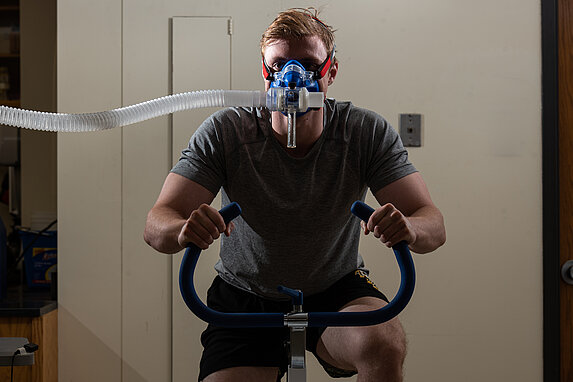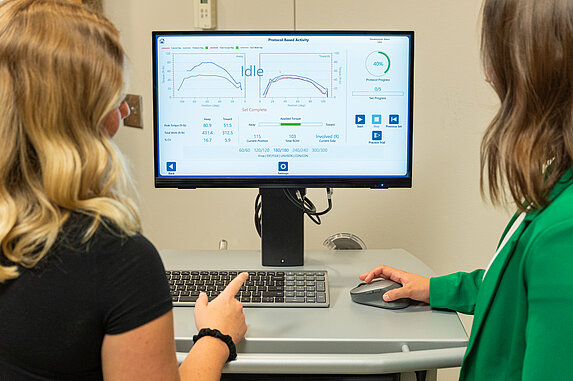Exercise/Nutrition Science


The Master of Science in Exercise/Nutrition Science option prepares the graduate for advanced positions with an emphasis in the areas of physical activity, exercise science, strength and conditioning, nutrition, sports nutrition, and health promotion. Potential careers can vary by student background but generally include: exercise physiologists, strength and conditioning specialist, health coach, exercise scientist, wellness coordinator, sports scientists, fitness center manager, registered dietitian, sports nutritionist, nutrition educator, public health nutritionist, or community nutritionist. The department is devoted to researching and understanding the long-term effects of exercise programming, physical activity, and nutrition, and translating this research into effective exercise/nutrition science and wellness programs for children, adolescents, and men and women of all ages, as well as athletes. This option is appropriate for dietetics, nutrition, kinesiology, health science, and exercise science graduates or related fields and contains three degree paths (Plan A- Thesis, Plan B- Paper, Plan C- Internship/Capstone). Each path contains a combination of in-person and online courses and is flexible based on the needs of the student applicant. More information on each path is described below. Upon acceptance students should try to declare their path of interests to their academic mentor before the first semester of enrollment (if possible) so the proper classes can be recommended.
Plan A- thesis
The traditional thesis typically includes a problem statement, a review of existing literature relevant to that problem, and the creation and presentation of new knowledge in providing a solution to the problem. Each student assembles a supervisory committee as described in the HNES and Graduate school handbooks. Each candidate is required to pass a final oral examination in which the supervisory committee serves as the examining committee. Following a successful defense, the candidate will submit an electronic copy of their thesis to the Graduate School for review and often there is an attempt to publish the work in a prestigious academic journal. This path is open to all students but is specifically recommended for students interested in academic or science careers or those who wish to explore further graduate work in the future. Pairing a student with faculty mentor that has experience in the area of interest is fundamentally important in this path. A list of faculty that mentor in this path is below.
Plan B- paper
The Plan B path will proceed thorough understanding of existing knowledge and the ability to apply/understand that existing knowledge to a problem of interest. Note that under this degree, the new knowledge being created is focused more on a singular review or manuscript type deliverable (rather than a novel research investigation), and this is the primary difference between the Plan A and Plan B paths. The precise nature of the individual creative component is defined by the faculty mentor, committee, and student. Examples of possible creative components include a comprehensive paper that is prepared for an academic or practitioner-based journal or an in-depth exploration of applicable technology in the area. Each candidate would assemble a supervisory committee and defend the product at a formal defense. This final submission to the Graduate College is to be approved by the student's supervisory committee. This path is open to all students but is specifically recommended for students who may have a focused interest in the field and may still be interested in further graduate work in the future, however, the scope of the next step is not yet defined.
Plan C-Internship/Capstone
Plan C is designed for programs in which a well-defined culminating experience is more important than is an individual creative component. Each program will define a culminating experience such as a capstone experience or some other approach to measure the candidate's understanding of the relevant material in the area (certification, certificate, internship experience/project). Upon completion of the appropriate course work and culminating experience, the candidate must submit to the Graduate School examination documentation (in collaboration with their mentor) and an Application for Graduate Degree. This path is open to all students but is specifically recommended for students who are currently employed part-time or full-time or and further graduate work beyond the MS program is not going to be pursued. Additional course work is included in this path to given a formal document and defense is not required to be submitted to the Graduate College.
Graduate Faculty eligible to mentor students: Dr. Bryan Christensen, Dr. Shannon David,Dr. Nathan Dicks, Dr. Marty Douglas, Dr. Matt Drescher, Dr. Julie Garden-Robinson,Dr. Kyle Hackney, Dr. Elizabeth Hilliard, Dr. Ryan McGrath, Dr. Yeong Rhee, Dr. Sherri Stastny, Dr. Brad Strand and Dr. Joshua Wooldridge.
Minimum criteria and application information to be considered for admission for all paths:
Note-meeting the minimum criteria does not guarantee acceptance in the program. Workload limitations and capacity limits for the program or faculty mentor apply.
- GPA 3.0 or higher
- Undergraduate major of Dietetics, Exercise Science, or closely related field.
- The GRE is NOT required for this degree option.
- Application to the NDSU Graduate School which includes: precise statement of purpose, official transcripts, and two professional letters of recommendation.
- In the application, please indicate what degree path (Plan A- Thesis, Plan B- Paper, Plan C- Internship/Capstone) you are primarily considering at this time. This path can change once admitted but provides the HNES department with preliminary information on your plan of study. A description of all the paths are described below.
- Please also note in your application if you are interested in a graduate assistantship position and indicate any previous experience with teaching, research, or other specific skills, abilities, or certifications you possess that would be relevant.
- After clicking on the link above, follow “domestic” or “international” student application requirements by further clicking the “apply” link beneath each area.
- Review of applications- Applications will be reviewed immediately once all requirements are completed through the graduate school application system and the application is released to the HNES department.
For Fall admission- Applications will be reviewed through August 1st for consideration.
For Spring admission- Applications will be reviewed through December 1st for consideration.
Summer admission is currently not an option for this degree path.
Note-Graduate assistantship awarded through the department will be considered for the top applicants, but are limited based in research grant funding and departmental resources.
All three paths (A, B, C) follow the same curriculum shown below:
30 total credits required
Research Course Core Requirements
Minimum 6 credits
-HNES 710. Introduction to Research Design and Methods in HNES
Select one course below:
-STAT 725. Applied Statistics
-HDFS 705. Quantitative Methods in Developmental Science
Exercise Science Course Core Requirements
Minimum 6 credits
Select from courses below:
-HNES 604. Adapted Physical Activity
-HNES 703. Graduate Biomechanics of Sport and Exercise
-HNES 704. Psychological Foundation of Sport & Physical Activity
-HNES 713. Graduate Exercise Physiology
-HNES 727. Physical Activity Epidemiology
-HNES 743. Obesity Across the Lifespan
-HNES 760. Skeletal Muscle Physiology
-HNES 761. Physiological and Fitness Assessment in Exercise Science
-HNES 762. Exercise Endocrinology
-HNES 764. Advanced Cardiovascular Exercise Physiology
-HNES 777. Scholarly Writing and Presenting in HNES
Nutrition Science Course Core Requirements
Minimum 6 credits
Select from courses below:
-HNES 642. Community Health and Nutrition Education
-HNES 658. Advanced Medical Nutrition Therapy
-HNES 668. Foodservice Systems Management II
-HNES 726. Nutrition in Wellness
-HNES 735. Nutrition and Human Performance
-HNES 750. Advanced Human Nutrition: Macronutrients
-HNES 754. Assessment in Nutrition and Exercise Science
Note- the first 6 credits completed in exercise science core and nutrition science core above will meet minimum requirements. Additional courses after the first 6 credits in each category are used to fill elective courses that are also listed below.
Culminating Experience Requirements
Note- the number of culminating experience credits will vary based on plan (A, B, or C). Consult with your advisor for departmental permission and enrollment.
Plan A- Thesis. 6 credits
Select the course below:
-HNES 798 Master’s thesis
Plan B paper. 3 credits
Select the course below
-HNES 797 Master’s paper
Plan C. Internship/capstone. 3 credits
Select from the courses below:
-HNES 795 Field experience
-HNES 794 Practicum/Internship
-HNES 793 Individual Study
HNES Electives Requirements
Select two/three courses from below based on our degree path (Plan A, B, or C) and the HNES course rotations to meet the 30 total credits required for the degree.
Plan A- Thesis. 6 credits
Plan B- Paper. 9 credits
Plan C- Plan C. Internship/capstone. 9 credits
-HNES 604. Adapted Physical Activity
-HNES 703. Graduate Biomechanics of Sport and Exercise
-HNES 704. Psychological Foundation of Sport & Physical Activity
-HNES 713. Graduate Exercise Physiology
-HNES 727. Physical Activity Epidemiology
-HNES 743. Obesity Across the Lifespan
-HNES 760. Skeletal Muscle Physiology
-HNES 761. Physiological and Fitness Assessment in Exercise Science
-HNES 762. Exercise Endocrinology
-HNES 764. Advanced Cardiovascular Exercise Physiology
-HNES 777. Scholarly Writing and Presenting in HNES
-HNES 642. Community Health and Nutrition Education
-HNES 658. Advanced Medical Nutrition Therapy
-HNES 668. Foodservice Systems Management II
-HNES 726. Nutrition in Wellness
-HNES 735. Nutrition and Human Performance
-HNES 750. Advanced Human Nutrition: Macronutrients
-HNES 754. Assessment in Nutrition and Exercise Science
-HNES 791. Temporary/Trial Topics
For information about Exercise /Nutrition Science program requirements, path curriculums, HNES course rotations, and further details on thesis/paper proposals, thesis/paper defenses, and internship/capstone requirements please explore the Exercise/Nutrition Science Handbook below:
MS Exercise/Nutrition Science Handbook
Need more information? Please fill out our graduate interest form link below.


